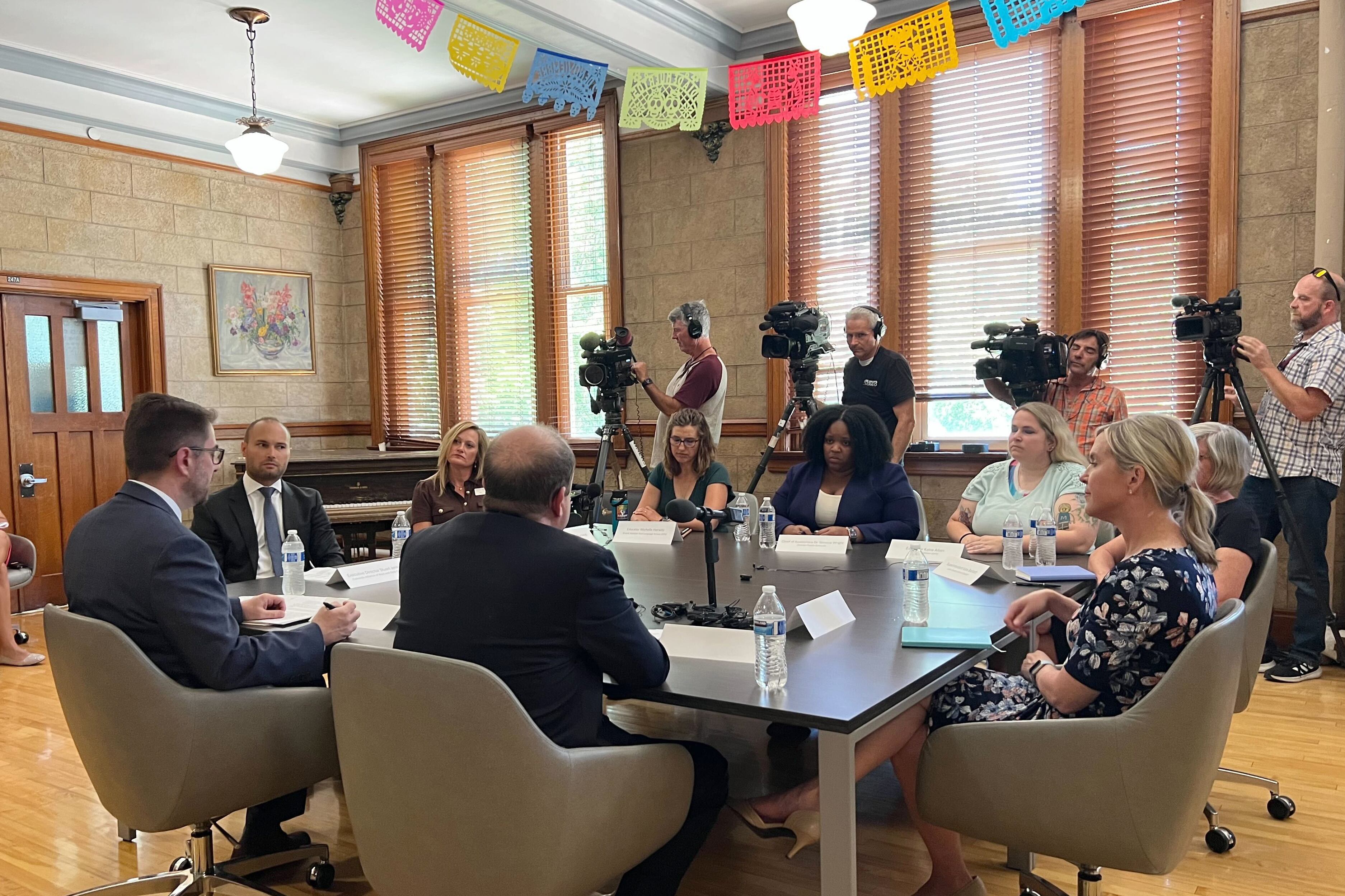Sign up for Chalkbeat Colorado’s free daily newsletter to get the latest reporting from us, plus curated news from other Colorado outlets, delivered to your inbox.
To serve an influx of new immigrant students, Jeffco Public Schools came up with an innovative idea last year: retrofitting a school bus to serve as a mobile welcome center. When new families arrive, a small team that speaks multiple languages shows up to help the family not only enroll in school but access basic needs like diapers and baby formula.
As a result of the Trump administration withholding $76 million in federal education dollars from Colorado, Jeffco Superintendent Tracy Dorland said the mobile welcome center is one of several programs at risk of losing its funding.
“We have newcomers all across Jeffco, so being able to have a mobile team that’s pretty flexible and can go to the families has been a game changer for us,” Dorland said, noting that the district, the state’s second largest, spans 800 square miles and 150 schools.
“Asking families to come to a centralized location doesn’t work for our newcomer families,” she said. “It’s one of the things I’m most worried about.”
Dorland spoke Wednesday at a roundtable discussion hosted by Colorado Gov. Jared Polis about the impact of the withheld funds. The Trump administration announced last week that it was holding back nearly $7 billion nationwide to ensure the money is spent according to the president’s priorities and not “to subsidize a radical leftwing agenda.” States were expecting to receive the funds July 1.
Some of the withheld funding is earmarked to support immigrant students, English language learners, and students whose parents are migrant farmworkers. Other funds pay for after-school and summer programs. Another pot of money is for teacher recruitment and training.
The Colorado Department of Education released a map this week showing how much funding each of the state’s 179 school districts stands to lose. Denver Public Schools would be out $11.9 million, according to the map. Jeffco Public Schools is waiting on nearly $3 million.
Polis called the withholding “absurd,” emphasizing that Colorado school districts were banking on these funds and have already set up programs and hired staff.
“You have teachers who don’t know if they have jobs at this point,” Polis said.
Dorland and other district leaders mostly declined to say how many staff members could lose their jobs if the funding doesn’t come through. But they said the timeline for making those decisions is as tight as 10 days from now.
Simone Wright, chief of academics for Denver Public Schools, gave one example: the equivalent of 11.3 full-time positions that are funded with Title III dollars. The educators in those positions help principals, deans, and teachers support students learning English as a second language. In DPS, that’s about a third of the district’s 90,000 students.
“For some districts, it’s a subgroup,” Wright said of multilingual learners. “For us, it’s who we serve.”
Katie Allen, a third grade teacher at Denver’s Florida Pitt-Waller ECE-8 School, spends half of her day coaching other teachers, including the school’s English language development teachers. She said losing that centralized district support would be “devastating.”
“I can see a lot of students slipping through the cracks if we don’t have those layers of support built around the classroom,” said Michelle Horwitz, a bilingual speech language pathologist at Bryant-Webster Dual Language ECE-8 School in Denver.
“Educators are tired of doing more with less,” Horwitz said.
Stuart Jenkins, the executive director of the Boys & Girls Clubs in Colorado, said the clubs in the metro areas of Denver and Pueblo were supposed to receive a combined $1.9 million in federal after-school funding to serve more than 2,000 children across 13 sites.
The two school districts in Pueblo, in the southern part of the state, have four-day school weeks, making the Boys & Girls Club programming even more essential there, he said.
“We worry these kids will have no safe space to go in Pueblo if these funds don’t come through,” Jenkins said, noting that many of the children are living in poverty.
Polis said he and other state leaders are urging the Trump administration to release the funds and are considering all options, including possible legal action. Asked if Colorado could make up the federal shortfall with state money, Polis said no.
“There is no additional money to spend,” he said.
Melanie Asmar is the bureau chief for Chalkbeat Colorado. Contact Melanie at masmar@chalkbeat.org.






